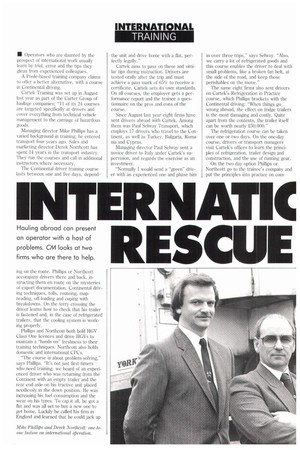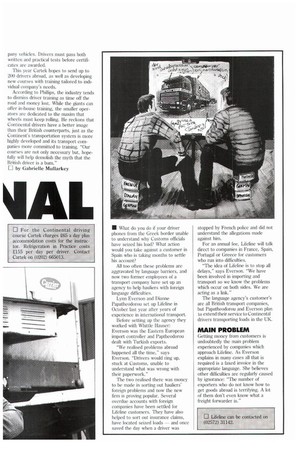14111111141AT C IAL SCIIE
Page 24

Page 25

If you've noticed an error in this article please click here to report it so we can fix it.
Hauling abroad can present an operator with a host of problems. CM looks at two firms who are there to help.
• Operators who are daunted by the prospect of international work usually learn by trial, error and the tips they glean from experienced colleagues.
A Poole-based training company claims to offer a better alternative, with a course in Continental driving.
Cartek Training was set up in August last year as part of the Carter Group of haulage companies: "11 of its 24 courses are targeted specifically at drivers and cover everything from technical vehicle management to the carriage of hazardous goods.
Managing director Mike Phillips has a varied background in training; he entered transport four years ago. Sales and marketing director Derek Northcott has spent 14 years in the transport industry. They run the courses and call in additional instructors where necessary.
The Continental driver training course lasts between one and five days, depend nig on the route. Phillips or Northcott accompany drivers there and back, instructing them en route on the mysteries of export documentation, Continental driving techniques, tolls, routeing, mapreading, off-loading and coping with breakdowns. On the ferry crossing the driver learns how to check that his trailer is fastened and, in the case of refrigerated trailers, that the cooling system is working properly.
Phillips and Northcott both hold HGV Class One licences and drive HGVs to maintain a "hands on" freshness to their training techniques. Northcutt also holds domestic and international CPCs.
"The course is about problem-solving," says Phillips. "It's not just first-timers who need training; we heard of an experienced driver who was returning from the Continent with an empty trailer and the rear end axle on his tractive unit placed needlessly in the down position. Ile was increasing his fuel consumption and the wear on his tyres. To cap it ali, he got a fiat and was all set to buy a new one to get home. Luckily he called his firm in England and learned that he could jack up
the unit and drive home with a flat, perfectly legally."
Cartek aims to pass on these and similar tips during instruction. Drivers are tested orally after the trip and must achieve a pass mark of 65% to receive a certificate. Cartek sets its own standards. On all courses, the employer gets a performance report and the trainee a questionnaire on the pros and cons of the course.
Since August last year eight firms have sent drivers abroad with Cartek. Among them was Paul Selway Transport, which employs 17 drivers who travel to the Continent, as well as Turkey, Bulgaria, Romania and Cyprus.
Managing director Paul Selway sent a novice driver to Italy under Cartek's supervision, and regards the exercise as an investment.
"Normally I would send a "green" driver with an experienced one and phase him
in over three trips," says Selway. "Also, we carry a lot of refrigerated goods and this course enables the driver to deal with small problems, like a broken fan belt, at the side of the road, and keep those perishables on the move."
'The same eight firms also sent drivers on Cartek's Refrigeration in Practice course, which Phillips brackets with the Continental driving: "When things go wrong abroad, the effect on fridge trailers is the most damaging and costly. Quite apart from the contents, the trailer itself can be worth nearly £50,000."
The refrigeration course can be taken over one or two days. On the one-day course, drivers or transport managers visit Cartek's offices to learn the principles of refrigeration, trailer design and construction, and the use of running gear.
On the two-day option Phillips or Northcott go to the trainee's company and put the principles into practice on corn pany vehicles. Drivers must pass both written and practical tests before certificates are awarded.
This year Cartek hopes to send up to 200 drivers abroad, as well as developing new courses with training tailored to individual company's needs.
According to Phillips, the industry tends to dismiss driver training as time off the road and money lost. While the giants can offer in-house training, the smaller operators are dedicated to the maxim that wheels must keep rolling. He reckons that Continental drivers have a better image than their British counterparts, just as the Continent's transportation system is more highly developed and its transport companies more committed to training. "Our courses are not only necessary but, hopefully will help demolish the myth that the British driver is a bum."
by Gabrielle MuHarkey • What do you do if your driver phones from the Greek border unable to understand why Customs officials have seized his load? What action would you take against a customer in Spain who is taking months to settle his account?
All too often these problems are aggravated by language barriers, and now two former employees of a transport company have set up an agency to help hauliers with foreign language difficulties.
Lynn Everson and Dianne Papatheodorou set up Lifeline in October last year after years of experience in international transport.
Before setting up the agency they worked with Whittle Ilauser: Everson was the Eastent European import controller and Paptheodorou dealt with Turkish exports.
"We realised problems abroad happened all the time," says Everson. "Drivers would ring up, stuck at Customs, unable to understand what was wrong with their paperwork."
The two realised there was money to be made in sorting out hauliers' foreign problems and now the new firm is proving popular. Several overdue accounts with foreign companies have been settled for Lifeline customers. They have also helped to sort out insurance claims, have located seized loads — and once saved the day when a driver was stopped by French police and did not understand the allegations made against him.
For an annual fee, Lifeline will talk direct to companies in France, Spain, Portugal or Greece for customers who run into difficulties.
"The idea of Lifeline is to stop all delays," says Everson. "We have been involved in importing and transport so we know the problems which occur on both sides. We are acting as a link," The language agency's customer's are all British transport companies, but Papathmlorou and Everson plan to extend their service to Continental drivers transporting loads in the UK.
MAIN PROBLEM
Getting money from customers is undoubtedly the main problem experienced by companies which approach Lifeline. As Everson explains in many cases all that is required is a faxed invoice in the appropriate language. She believes other difficulties arc regularly caused by ignorance: "The number of exporters who do not know how to get goods abroad is terrifying. A lot of them don't even know what a freight forwarder is."




































































